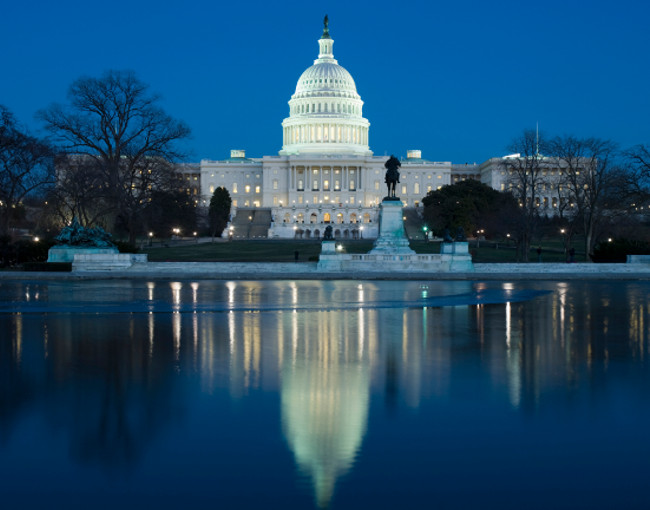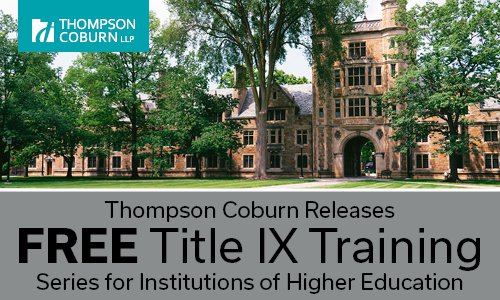


On March 25, 2020, the Senate approved a $2 trillion relief and stimulus package designed to address the economic impact caused by the COVID-19 pandemic. Two days later, the House of Representatives passed the legislation, and President Trump signed it into law. The Coronavirus Aid, Relief, and Economic Security (“CARES”) Act, also known as COVID III, is the third such supplemental appropriations law passed by Congress, with additional packages anticipated in the coming months.

Below, we provide a brief overview of the provisions of the Act that most directly concern institutions of higher education and their borrowers. In some cases, the statutory language contemplates extraordinary waivers, assistance, and accommodations, with very little detail regarding when and how such relief will become available.
As a threshold matter, we emphasize that the Act makes no distinction between private, non-profit institutions and private, proprietary institutions in the provisions discuss below.
Regulatory Relief (Section 3501 et seq.)
We highlight here that the CARES Act does not give the Department broad authority to grant statutory or regulatory waivers to institutions of higher education. Early drafts of the legislation included language granting the Department the authority to “waive any statutory or regulatory requirement (such as those requirements related to assessments, accountability, allocation of funds, and reporting). if the Department determines that such a waiver is necessary and appropriate.” However, this language did not make it into the final bill. This means, absent further legislation, statutory and regulatory deadlines remain unchanged.
Education Stabilization Fund (Section 18001 et. seq.)
Of the $2 trillion available, the CARES Act creates a $30.75 billion Education Stabilization Fund. About $14 billion of the Education Stabilization Fund is allocated to the Higher Education Emergency Relief Fund. The Higher Education Emergency Relief Fund, in turn, is apportioned as follows:
Institutions may use the funds received “to cover any costs associated with significant changes to the delivery of instruction due to the coronavirus, so long as such costs do not include payment to contractors for the provision of pre-enrollment recruitment activities; endowments; or capital outlays associated with facilities related to athletics, sectarian instruction, or religious worship.” At least 50% of the funds awarded must be used for emergency financial aid grants to students. Institutions receiving funds must submit a report to the Department that describes the use of the funds.
Paycheck Protection Program (Section 1102)
Included in the CARES Act is $349 billion for Small Business Administration forgivable loans. Businesses or non-profits with less than 500 employees, or the applicable size standard for the industry, can apply for a loan through June 30, 2020. The maximum loan amount is $10 million and it may be used for payroll costs, costs related to the continuation of group health care benefits, salaries, payments of mortgage interest, rent, utilities, and debt obligations that were incurred before February 15, 2020. Part or all of the loan may be forgiven if the business or non-profit maintains its payroll. The law also includes other Small Business Administration loans and program changes that may ultimately be of interest to the higher education community.
Temporary Relief for Federal Student Loan Borrowers (Section 3513)
Payments on federal student loans that are held by the Department are suspended through September 30, 2020.
During the duration of the suspension, the Department shall suspend all involuntary collection on loans. We emphasize that the Department can only suspend collection on loans owned by the U.S. Department of Education, which include Direct Loans and loans made under the Federal Family Education Loans Program (FFELP) that were transferred to the Department. Perkins Loans, FFELP loans held by a bank or other financial institution, and private education loans are not covered by the suspension.
Employer Payment of Student Loans (Section 2206)
The CARES Act temporarily modifies 26 U.S.C. § 127 to permit employers, as part of an educational assistance program, to make payments toward an employee’s student loan obligation on a tax-free basis through the end of 2020. The maximum amount an employee can receive tax free for all educational expenses, including student loan payments, is $5,250. Such employer payments would not be treated as income for the employee.
Service Obligations for Teachers (Section 3519)
Under the TEACH Grant program, the Department may modify the categories of extenuating circumstances under which a grant recipient is unable to fulfill his or her service obligation, and shall consider part-time service interrupted by COVID-19 to be full-time service. The Department will also waive the requirement that teaching service be consecutive if the student resumes teaching after an interruption due to COVID-19.
Thompson Coburn will be monitoring the implementation of these provisions closely, and expects to provide updates as additional information becomes available. Postsecondary institutions with questions regarding the impact of the CARES Act on higher education are welcome to contact the authors of this blog post.
Aaron Lacey is the leader of Thompson Coburn’s Higher Education practice, host of the Firm’s popular Higher Education Webinar Series, and editorial director of REGucation, the Firm’s higher education law and policy blog. Chris Murray is the co-chair of Thompson Coburn’s Lobbying & Policy practice group, and has been recognized for the depth of his knowledge of education policy, which spans all corners of education, from pre-K through primary, secondary, and postsecondary, from institutions and trade associations to technology companies and investors. Scott Goldschmidt is the former Deputy General Counsel for a prominent institution of higher education, and a member of the firm’s Higher Education practice.
Click here to subscribe to News & Insights from Thompson Coburn related to our practices as well as the latest on COVID-19 issues.
[1] We know there will be many questions regarding the scope and implementation of this provision. At present, there is no additional detail in the legislation. However, we anticipate that clarifying commentary from the U.S. Department of Education will be forthcoming.